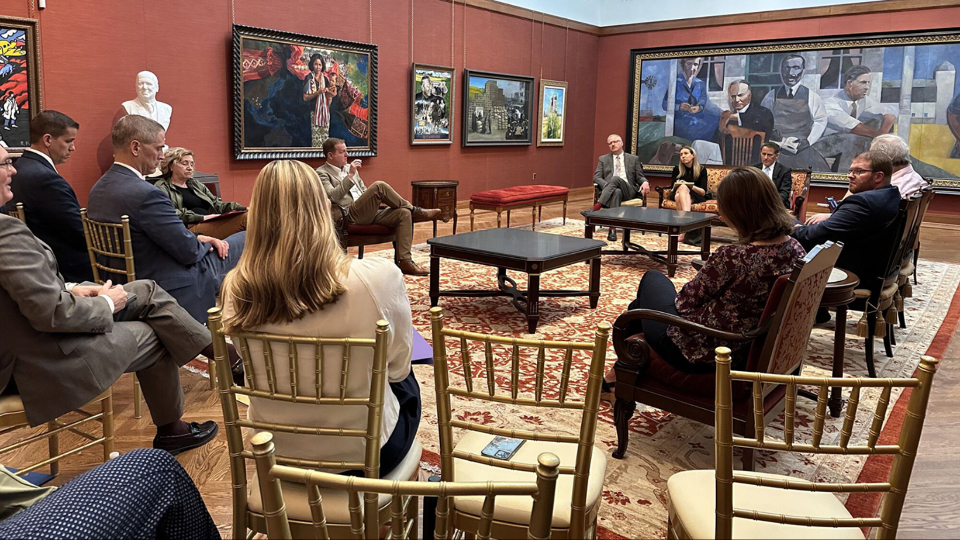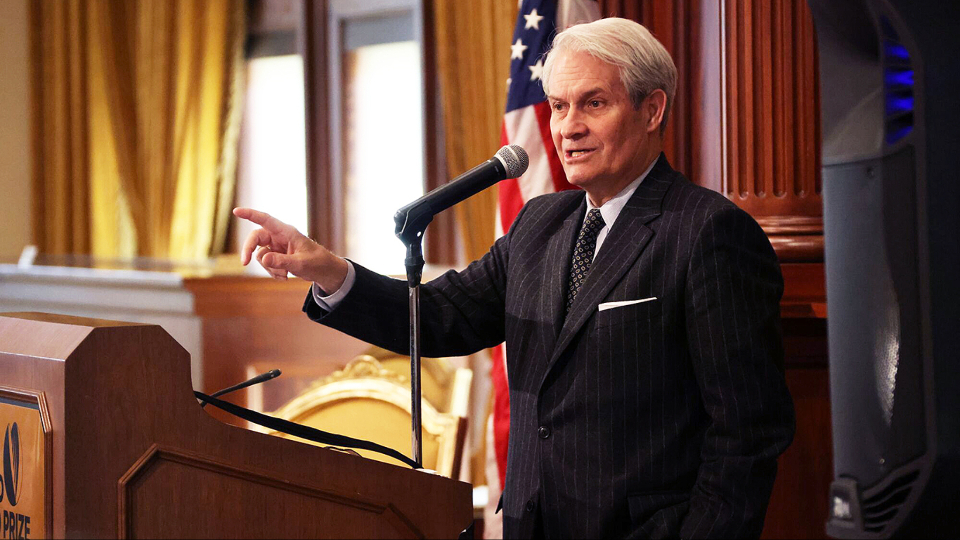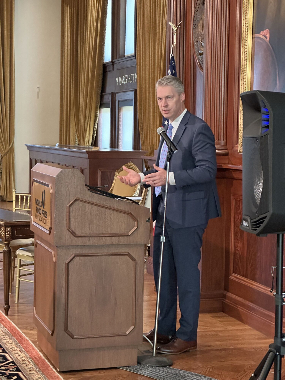| Temple Square is always beautiful in the springtime. Gardeners work to prepare the ground for General Conference. © 2012 Intellectual Reserve, Inc. All rights reserved. | 1 / 2 |
This story appears here courtesy of TheChurchNews.com. It is not for use by other media.
By Susan Sims for Church News
Leaders of The Church of Jesus Christ of Latter-day Saints in Des Moines, Iowa, gathered with academics, attorneys, faith leaders and community members in the World Food Prize Hall of Laureates to celebrate the 10th annual Iowa Religious Freedom Day on April 13.
The event fell on the same day as the awarding of the Ghandi-King-Mandela Peace Prize to President Russell M. Nelson in Atlanta, Georgia, and the gathering in Iowa also focused on bringing people together to model “how to manage honest differences of opinion with mutual respect and dignified dialogue” (President Nelson, in “Peacemakers Needed,” April 2023 general conference).
The summit opened with a welcome from World Food Prize President Terry Branstad, former governor of Iowa and former U.S. ambassador to China, who signed the first Iowa Religious Freedom Day proclamation 10 years ago. Branstad shared the purpose of the World Food Prize with the nearly 150 attendees and highlighted Iowa’s tradition of respecting diverse religious faiths.

Iowa
A panel discusses the importance of looking for shared interests between people who may not share the same perspective during the Fairness for All Summit on the 10th annual Iowa Religious Freedom Day in Des Moines, Iowa, April 13, 2023. Photo by Susan Sims, courtesy of Church News.All rights reserved.
Four keynote speakers provided remarks in the daylong Fairness for All Summit, including G. Marcus Cole, dean of the Notre Dame Law School; Thomas B. Griffith, a Latter-day Saint and retired justice from the U.S. Court of Appeals for the District of Columbia Circuit; the Rev. Marian Edmonds-Allen, executive director of Parity New York; and Steven T. Collis, director of the Bech-Loughlin First Amendment Center at the University of Texas School of Law.
Also on hand to discuss the Utah Compromise was Mike Mower, a senior adviser to Utah Gov. Spencer Cox. Mower and the Rev. Edmonds-Allen were on opposite sides of the issue in 2015 but eventually learned how the state of Utah could protect religious rights and those of the LGBTQ community at the same time.
Hearing their different paths to that compromise “was enlightening and refreshing,” said Matt Fillmore of the Iowa City Iowa Stake.
Cole shared information about the Notre Dame Religious Liberty Initiative to explain why supporting religious freedom is so important. “If people have freedom of conscience, freedom to read, pray, believe and act upon those beliefs, then corruption, injustice and abuse of power will be exposed.”
That is why authoritarians attack religion and why it’s the first freedom that must be protected internationally, he said.
Cole also reminded people what religious freedom is not: It is not a license to discriminate, nor should it be used to impose one’s theocracy on another. It should be, he affirmed, the vehicle for religious people to do good in society.
It is a motivating force to live the good that people of faith espouse, and it has allowed the United States to become the world’s most prosperous nation. In addition, Cole provided insights into the legal relationship between religious freedoms and civil rights.
Griffith asked those of faith in the audience, “Are we using the religious liberty we have to bind people together or are we using it to divide?”
Noting that some people do use it as a divisive tool, he warned, “If people of faith want to persuade an increasingly secular American society that religious freedom is a value that is rightly placed in the Constitution … we have to show that religion unites people.”
The increasing rise of societal contempt threatens to undermine the Constitution like nothing else since the Civil War, Griffith said.
Reviewing details from the Philadelphia Constitutional Convention, Griffith called attention to the spirit of amity, mutual deference and concession that prevailed at the convention in 1787. Delegates agreed in advance to compromise for the sake of unity, and they were allowed to freely change their minds and votes in the process.
People should follow their example, said Griffith, and do as President Dallin H. Oaks, First Counselor in the First Presidency, urges: “on contested matters, we should seek to moderate and unify.”
Panel discussion topics ranged from interfaith cooperation to campus free speech to civil discourse. Panelists were organized by local attorneys Jay Helton and Lee Prince of the Des Moines Iowa Stake.

Iowa
Thomas B. Griffith, retired justice from the U.S. Court of Appeals for the District of Columbia Circuit, speaks at the Fairness for All Summit on the 10th annual Iowa Religious Freedom Day in Des Moines, Iowa, April 13, 2023. Photo by Susan Sims, courtesy of Church News.All rights reserved.
The overarching messages focused on the importance of looking for shared interests between people who may not share the same perspective.
The “Nonreligious Views of Religious Freedom” panel provided secular humanists the chance to help the more religious audience understand their viewpoints and even pain at being marginalized in a society where they feel government promotes religion in general.
Jason Benell of the Iowa Atheists and Freethinkers said afterward that he appreciated people were listening respectfully. In a panel on having civil discussions with issue opponents, Abena Imhotep offered steps for working with a group with a different viewpoint: Stay engaged, speak your truth, listen for understanding, commit to having responsibility in the communication, honor confidentiality, and expect and accept nonclosure.
State Sen. Sarah Trone Garriott, minority whip in the Iowa State Senate, is an ordained Lutheran pastor. In a panel discussion about interfaith cooperation, she said there is “something about spending time with my neighbors of different religious or nonreligious beliefs — I am inspired by them.”
Garriott has worked with local Church members on a number of interfaith and charitable efforts over the past several years.
Prior to lunch, Iowa Gov. Kim Reynolds arrived to sign a proclamation naming April 13 as Iowa Religious Freedom Day. She exchanged greetings with Elder Jeremiah J. Morgan, Area Seventy in the Church’s North America Central Area, before sharing some remarks and then signing the proclamation.

Iowa
Elder Jeremiah J. Morgan, Area Seventy for the Church’s North America Central Area, speaks during the Fairness for All Summit on the 10th annual Iowa Religious Freedom Day in Des Moines, Iowa, April 13, 2023. Photo by Susan Sims, courtesy of Church News.All rights reserved.“People of faith have repeatedly been a driving force behind some of our nation’s most spectacular moral advances,” Reynolds said. “Today, they continue to make enormous contributions to all manner of charitable and volunteer efforts, and we’re stronger for it.”
The proclamation highlights the benefits of a “pluralistic society where religious and nonreligious people work together for the common good despite divergent viewpoints.”
In the afternoon, the Rev. Edmonds-Allen told her story as a member of clergy and the LGBT community, of her work with homeless youth in Utah, and the unlikely ally she found in a legislative aide who opposed her that helped her see the value of working with an opponent.
“Our working against each other isn’t going to get us anywhere,” she said.
She supports “fairness for all” as the best way to balance religious liberty and nondiscrimination, even if groups on either extreme oppose her work.
One area of interest for the Rev. Edmonds-Allen is in “covenantal pluralism,” which is about encouraging people to come together without lending moral equivalency to each other’s beliefs, and cooperating for good in the world.
Working as part of the Fairness for All coalition, the Rev. Edmonds-Allen is helping to promote legislation and cooperative engagement across the United States and internationally.
Collis took the audience through a brief history of the legal and cultural definition of the word “dignity,” explaining how the current trend toward “reactionary dignity” reduces both freedom of choice and ultimate dignity for all.
By insisting all people should be protected from all harm, even open disagreement, reactionary dignity denies the rational thinker the right to choose among opinions in the marketplace of ideas. This was important in explaining that too much litigation surrounding religious freedom is only focused on “dignitary harm” rather than actual harm.
He shared examples from past and current case law and fielded questions on specific cases.
“The idea of fairness for all,” Collis explained, “is that we can protect people from certain levels of discrimination but also allow people of very different beliefs about the world, sexuality, or the purpose of life to … thrive alongside one another despite those beliefs.”
It was clear from the exchange between audience members and speakers that many people see religious freedom as protecting only religion, and often only Christianity. The keynote speakers were able to help attendees see that fairness for all is not the same thing as other religious freedom efforts. Instead, it works to promote the civil rights of all, while calling on all opposing groups to find room for compromise in the search for social cohesion.
The Church supports and promotes fairness for all throughout the world, and the Iowa Religious Freedom Day summit added to those efforts.
“I felt inspired by the clarity, willingness, and boldness to discuss these big topics,” said Julianne Weaver from Cedar Falls, Iowa.
As Elder Morgan pointed out in his closing remarks, “Sometimes we think everything is a zero-sum game, and it is just not. … There are ways to compromise in complex situations that will bless and benefit everyone’s lives.”
Copyright 2023 Deseret News Publishing Company.

